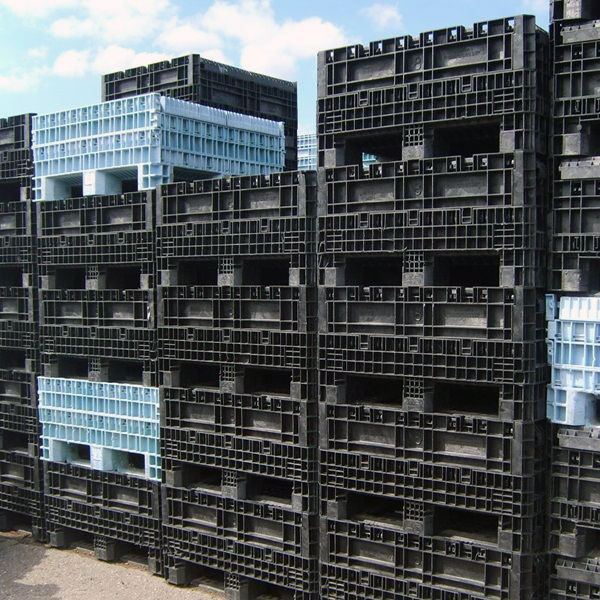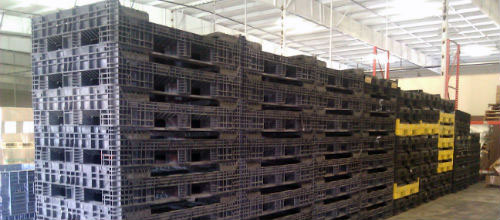Why Mass Containers Are Essential for Cost-Effective and lasting Transport
Bulk containers play an essential role in modern logistics. They help with the effective movement of big amounts of goods, thus maximizing transportation procedures. This method not only minimizes expenses yet likewise minimizes ecological influence through lower discharges and waste generation. As markets seek even more sustainable methods, the adoption of mass containers is becoming progressively considerable. What effects does this shift hold for future logistics and supply chain administration?
.jpg.png)
The Benefits of Using Bulk Containers in Logistics
Mass containers change logistics by enhancing efficiency and sustainability. These containers permit for the transportation of huge amounts of products in a solitary journey, significantly reducing the number of trips called for. This not only improves operations but additionally reduces labor prices related to handling, loading, and discharging. On top of that, bulk containers are created to maximize room application within transportation lorries, making sure that even more products can be delivered simultaneously.
The standardization of bulk containers also streamlines the logistics procedure. With consistent dimensions, they can be quickly piled and stored, causing enhanced storage facility monitoring. Moreover, mass containers frequently include long lasting materials that safeguard contents from damages throughout transit, consequently decreasing item loss and enhancing total reliability. Because of this, organizations can experience enhanced supply chain efficiency, inevitably resulting in raised productivity and consumer complete satisfaction. This mix of variables makes bulk containers a crucial property in modern-day logistics.
Ecological Effect: Reducing Waste and Carbon Footprint
As sectors progressively prioritize sustainability, the fostering of mass containers has become a key approach for reducing waste and lowering carbon footprints. These containers lessen using product packaging products, such as boxes and plastic, thereby significantly lowering total waste generation. By consolidating deliveries, mass containers boost transport performance, permitting even more products to be carried per trip. This decrease in journeys straight correlates with reduced greenhouse gas discharges, adding to a smaller carbon footprint.
Furthermore, mass containers can often be reused or reused, even more alleviating environmental impact. The toughness of these containers warranties they can stand up to numerous transport cycles, decreasing the need for single-use alternatives. used bulk containers. By simplifying logistics and promoting reliable resource use, bulk containers not just sustain sustainable practices but additionally encourage sectors to align with international ecological goals. Eventually, their implementation shows a dedication to ecological stewardship and responsible source monitoring
Expense Financial Savings: Just How Bulk Containers Lower Transportation Costs
While several firms seek means to improve their lower line, making use of mass containers offers a considerable opportunity for reducing transportation expenses. Bulk containers make the most of the volume of products carried, allowing organizations to ship bigger amounts simultaneously. This effectiveness reduces the number of journeys required, straight decreasing gas prices and decreasing labor costs connected with loading and dumping.
Additionally, bulk containers frequently feature streamlined layouts that optimize space usage within transportation lorries. This implies less voids, causing much more effective use available ability. In addition, the resilience of mass containers can reduce the threat of item damages throughout transit, decreasing losses and making sure that even more goods get here intact.
Enhancing Supply Chain Efficiency With Mass Storage Space Solutions
Mass storage remedies play a vital role in improving supply chain efficiency by enhancing supply administration. By consolidating goods into fewer, larger containers, companies can significantly lower managing costs related to constant transfers and processing. This streamlined technique permits for much better monitoring and monitoring of inventory, eventually resulting in improved functional performance.
Structured Inventory Management
Effective inventory management is necessary for maximizing supply chain operations, especially when organizations adopt bulk storage space options. These options make it possible for services to maintain greater stock levels while decreasing the regularity of replenishment. By combining products right into mass containers, business can simplify their supply procedures, minimizing the complexity related to tracking several smaller packages. This technique helps with exact inventory matters and improves forecasting precision, enabling even more informed decision-making. In enhancement, bulk storage services simplify stockroom organization, making it easier to situate and accessibility items when needed. As an outcome, companies can accomplish a more efficient supply turn over price, inevitably boosting total supply chain efficiency and minimizing the possibility of stockouts or overstock scenarios.

Reduced Handling Prices
The execution of mass storage services not only simplifies inventory management yet likewise considerably lowers dealing with expenses throughout the supply chain. By consolidating products into bulk containers, companies reduce the need for regular handling and transfer in between various storage space and transportation units. This approach reduces labor costs connected with loading, discharging, and moving smaller bundles. In addition, bulk storage reduces the regularity of deliveries, leading to lower transportation expenses and decreased fuel intake. As an outcome, organizations can optimize their logistics operations, permitting an extra efficient appropriation of resources. Ultimately, minimized dealing with prices add to enhanced general supply chain performance, fostering an environment that supports both sustainability and economic viability.

Adaptability of Mass Containers Across Different Industries
Although several industries have distinctive requirements for transportation and storage space, bulk containers have become a functional service that satisfies a variety of requirements. These containers, ranging from large containers to specialized tanks, can accommodate diverse materials, including granules, liquids, and powders. In the farming field, mass containers facilitate the transport of fertilizers and grains, while the food and beverage market uses them for components and finished items. The chemical market relies upon bulk containers for securely carrying hazardous materials, guaranteeing conformity with safety and security laws. In addition, building and construction firms gain from mass containers for moving accumulations and various other products. Their flexibility includes different modes of transport, including ships, trucks, and trains, boosting logistical effectiveness. This flexibility not just enhances procedures across different industries but also advertises sustainability by reducing product packaging waste and maximizing area in transit. As a result, mass containers play a vital function in modern-day supply chain management.
Future Patterns in Mass Container Usage and Sustainability
The future of mass container use is significantly formed by innovative materials growth that enhances sustainability. Furthermore, automation in logistics promises to streamline operations, reducing waste and enhancing performance. Welcoming round economic situation practices will better transform exactly how bulk containers are designed, utilized, and reused, cultivating a more lasting transport landscape.
Innovative Materials Development
As markets increasingly prioritize sustainability, innovative materials growth wholesale containers arises as a significant consider boosting environment-friendly transport options. Producers and researchers are discovering biodegradable plastics, recycled compounds, and light-weight metals to decrease ecological influence. These products not just lessen waste yet additionally boost fuel effectiveness by reducing the overall weight of containers. Furthermore, improvements in clever products, which can adjust to varying problems, enhance the resilience and capability of mass containers. The integration of these innovative materials lines up with round economic climate principles, promoting reuse and recycling. As the need for lasting practices grows, the growth of such products will certainly website play an important role in shaping the future of bulk container usage in logistics and transportation.
Automation in Logistics
Significant improvements in automation are poised to transform logistics and the use of bulk containers, boosting sustainability in transport. Automated systems, consisting of drones and self-governing cars, are simplifying the activity of mass containers, reducing the reliance on typical fuel-powered transportation. These modern technologies maximize directing and packing procedures, decreasing vacant miles and boosting fuel effectiveness. In addition, automated supply monitoring systems boost tracking and surveillance of mass containers, making sure far better source allotment and decreased waste. The combination of the Web of Points (IoT) allows real-time information analysis, allowing proactive decision-making that straightens with sustainability objectives. As automation proceeds to progress, it is expected to drive better technologies in bulk container usage, ultimately supporting more lasting logistics techniques and lowering the environmental impact of transportation.
Circular Economic Climate Practices
Improvements in automation are setting the phase for an extra incorporated approach to round economy methods in the domain of bulk container usage. As markets significantly welcome sustainability, mass containers are being made for long life and reusability. This change not only decreases waste yet also enhances resource effectiveness. Firms are adopting techniques such as closed-loop systems, where utilized containers are collected, reconditioned, and reestablished into the supply chain. Furthermore, smart technologies track container life process, facilitating much better administration and decreasing ecological effect. The collaboration in between suppliers, logistics providers, and end-users is essential in developing requirements for sustainable container usage. used plastic containers. Future patterns suggest an expanding focus on materials that are eco-friendly and recyclable, more reinforcing the round economic situation's principles wholesale transportation

Often Asked Concerns
What Materials Are Bulk Containers Generally Made From?
Mass containers are normally constructed from sturdy products such as high-density polyethylene, steel, light weight aluminum, and cardboard. These products supply toughness, adaptability, and security, making them appropriate for transporting numerous goods in various sectors effectively.
Just how Do I Select the Right Size Bulk Container?
Picking the ideal size mass container includes evaluating the quantity of products to be moved, thinking about managing devices compatibility, and appraising storage room needs. Correct size guarantees efficiency in transport and minimizes waste throughout delivery.
Are Bulk Containers Reusable or Recyclable?
Mass containers are commonly multiple-use, designed for several journeys, enhancing sustainability. Numerous can likewise be recycled, depending upon the products utilized. Selecting recyclable alternatives additionally supports environmental objectives and reduces waste in transport techniques.
What Security Rules Put On Bulk Container Transportation?
Security guidelines for mass container transportation include compliance with the Division of Transport guidelines, correct labeling of dangerous products, structural honesty analyses, and adherence to weight limitations to assure secure handling and avoid crashes during transit.
Just How Can Organizations Shift to Using Mass Containers Efficiently?
Businesses can transform to bulk containers by reviewing existing logistics, educating staff on handling, spending in ideal devices, enhancing stock administration, and collaborating with providers to ensure compatibility and efficiency throughout the supply chain.
As industries increasingly prioritize sustainability, the fostering of mass containers has arised as a key approach for decreasing waste and lowering carbon footprints. By consolidating products into bulk containers, firms can improve their stock processes, reducing the complexity linked with tracking multiple smaller plans. As markets increasingly focus on sustainability, ingenious products growth in bulk containers emerges as a considerable element in improving environmentally friendly transport remedies. Automated systems, consisting of drones and self-governing lorries, are enhancing the activity of bulk containers, reducing the reliance on typical fuel-powered transport. In addition, automated inventory monitoring systems boost tracking and monitoring of mass containers, making certain far better source allotment and lowered waste.